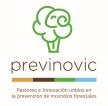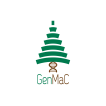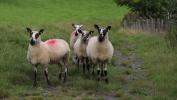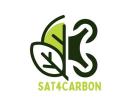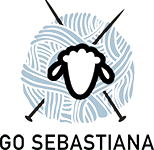
SEBASTIANA Operational Group: Wool selection and classification to improve the competitiveness of small sheep farms
- Type Operational group
- Status Filled
- Execution 2022 -2025
- Assigned Budget 599.754,15 €
- Scope Supraautonómico
- Autonomous community Castilla y León; Madrid, Comunidad de
- Main source of financing CAP 2014-2020
- Project website https://gosebastiana.com
Currently, wool is considered a by-product and sheep farmers barely receive any compensation for it (€0.00 to €0.40/animal), which represents an additional cost for the sheep farmers due to the associated shearing tasks (€1.5/animal). Given this situation and considering the low profit margins with which the sheep sector works, it is necessary to implement innovative measures to improve and standardize the quality of wool, allowing for its revaluation and easier classification by quality, giving farmers negotiating power with third parties. Likewise, a possible solution for the sector is to shorten the marketing channels for wool, for which a differentiated transformation and sale of it at a local level is proposed, instead of being exported to distant foreign countries and returned to the peninsula in the form of imported different fabrics, having a great impact on reducing the carbon footprint and attracting young rural people and wool artisans attracted by the local industry.
- Training livestock farmers in classification tasks prior to shearing.
- Implementation of an objective wool quality analysis procedure.
- Identification of wool-enhancing animals and monitoring of offspring.
- Verification of nutritional and animal-based factors or management that influence wool quality.
- Definition of the wool washing and classification process.
- Design of a simple wool quality cataloging system for livestock farmers.
- Implementation of a digital platform for livestock farmers and clients as a meeting channel and potential wool marketing channel.
- Report on the economic, social and environmental impact of the new comprehensive system.
The sheep sector has faced significant fluctuations in wool prices in recent years. In this context, it is difficult to maintain profit margins, in which the price of wool plays a key role, although it is not easy to modify it on the farm level. It is worth remembering that current production systems are primarily oriented toward meat production, considering wool as a byproduct of this production system, to which insufficient resources have been allocated to allow for the development of new advances and a revaluation that would improve its value and profitability. However, today, with available technologies, it would be possible to consider developing dual-purpose sheep production systems, meat and wool, to boost the profitability of extensive sheep farming linked to rural areas. In this context, there is a market need to improve the profitability of sheep farming, with the aim of making it more sustainable in the medium term. In short, this innovative wool processing project will be a pioneer in its sector, offering a new paradigm for small and medium-sized farms that struggle to manage their wool, which represents an additional cost rather than a benefit. In addition to being a project that boosts the rural economy, it also creates synergies and generates environmental and social benefits.
- Implement a comprehensive model for wool selection, classification and marketing aimed at increasing the competitiveness and profitability of small farms
- Development and consolidation of a wool quality improvement plan through objective analysis procedures and highly heritable phenotypic selection (wool fiber diameter).
- Start-up of a small wool processing industry
- Increase the economic profitability of Castilian sheep farms through the direct sale of differentiated (pre-classified) wool and associated services to the small wool processing industry created.
Development and consolidation of a wool quality improvement plan through objective analysis procedures and highly heritable phenotypic selection (wool fiber diameter).
Main results:
- Training livestock farmers in classification tasks prior to shearing.
- Implementation of an objective wool quality analysis procedure.
- Identification of wool-enhancing animals and monitoring of offspring.
- Verification of nutritional and animal-based factors or management that influence wool quality.
Practical recommendations: Given the current situation in the sector, wool quality improvement at the farm level is contemplated through objective phenotypic analysis and selection procedures that are highly heritable and of great interest to the textile industry (e.g., wool fiber diameter). This approach does not require genotypic analysis, which would make the process excessively expensive and unviable. The approach also maintains compatibility with the meat traits currently considered in breeding processes. Thus, it is considered that, in a methodologically simple manner, thanks to the use of advanced analysis technologies, it will be possible to obtain results in a relatively short period of time, with the farmer's active participation.
Start-up of a small wool processing industry.
Main results:
- Definition of the wool washing and classification process.
- Design of a simple wool quality cataloging system for livestock farmers.
Practical recommendations: the project has focused on setting up a small wool processing industry. The aim is to offer a close and reliable service to local farmers, avoiding the need to collect unprofitable wool thanks to both the improvement in quality addressed in objective 1 of the project and the basic training of farmers in matters of shearing, classification and cataloging of wool, which puts them in a better negotiating position.
- To increase the economic profitability of Castilian sheep farms through the direct sale of differentiated (pre-classified) wool and associated services to the small wool processing industry created.
Main results:
- Implementation of a digital platform for livestock farmers and clients as a meeting channel and potential wool marketing channel.
- Report on the economic, social, and environmental impact of the new comprehensive system from the perspective of livestock and rural sustainability. Practical recommendations: This has been proposed to facilitate the sale of wool and to practically quantify the economic, social, and environmental benefits that can result from the implementation of this new wool marketing model, which eliminates intermediaries and provides economic benefits through direct sales at the local level.
To this end, a new digital platform has been created for meeting and potentially disseminating knowledge between farmers and customers. This platform will strengthen and enhance the trade's visibility by publishing availability, origins, quality, and needs.
- Coordinator/entity name: IMASDE AGROALIMENTARIA, SL
- Postal address: C. Nápoles, 3, 28224 Pozuelo de Alarcón, Madrid
- Coordinator/entity email: administracion@ovigen.es
- Telephone: +34 674971968
- IMASDE AGROALIMENTARIA, S.L.
- Centro de selección y mejora genética de ovino y caprino de Castilla y León (OVIGEN)
- Genovis soc
- coop.
- El Navazo S.C
- Ovintegral iberia S.L.
- Proyecto Dlana S.L.
- Asociación española de criadores de ganado ovino selecto de raza castellana (ANCA)
- Instituto de Ganadería de Montaña (IGM)
- Consejo superior de Investigaciones científicas (CSIC)
- Universidad de León
- Digital Innovation Hub on Livestock
- Environment
- Agriculture &
- Forest (DIH-LEAF)
- Akisplataforma.es recommends GO SEBASTIANA
- X
- Youtube (channel)
- Presentation video of the GO SEBASTIANA project
- Start-up of OVINTEGRAL's wool processing center
- GO SEBASTIANA, WOOL: A PROFITABLE AND SUSTAINABLE BYPRODUCT FOR LIVESTOCK?
- GO SEBASTIANA. Efficiency and improved wool quality. Profitability within our r…
- Detail of the downloadable banner of the Good Practices Guide
- XXVI National Sheep Forum 2024
- Last day of shearing in Serradilla del Arroyo
- GO Sebastiana present at the NaturCyL Fair
- Start-up of the wool processing center
- Project results and visits to the Ovintegral wool processing center
- Visit of sheep wool experts from Uruguay
- Webinar: Advances in the revaluation of wool
- End of his journey weaving new opportunities
- Guide to good shearing practices
- Closing of the GO Sebastiana project and achievements
- The path taken by the revaluation of wool
- Discover the goals achieved by GO Sebastiana
- Ovigen closure of the GO Sebastiana project and achievements
- Genovis closes the GO Sebastiana project and achieves
- Anca closure of the GO Sebastiana project and achievements
- Paw with the Good Shearing Practices Guide
- Closing of the GO Sebastiana project and achievements
- Complete closure of the GO Sebastiana project and achievements
- Closing of the GO Sebastiana project and achievements
- Dissemination on the INTEREMPRESAS website
- Dissemination on the RED PAC.es website
- Dissemination on the website of the Royal Spanish Federation of Selected Livest…
- Distributed in the magazine GANADERÍA
- Dissemination on the GANADERIA website.
- Radio interview: ONDA AGRARIA. 02/02/2025 from minute 28:30
- Radio interview: Live! Segovia
- FACEBOOK GO TO SEBASTIANA
- INSTAGRAM GO SEBASTIANA
- TWITTER user GO SEBASTIANA
- Dissemination of NAVAZO
- El Navazo Livestock Farm
- Dissemination of OVINTEGRAL
- DLANA's dissemination through Instagram
- DLANA dissemination through Facebook
- GENOVIS Dissemination via Instagram
- OVIGEN dissemination via Instagram
- Dissemination of IMASDE through LinkedIn
- Ovigen
- Genovis
- HAUNCH
- The Navazo
- Ovintegral
- DLana
- Imasde




